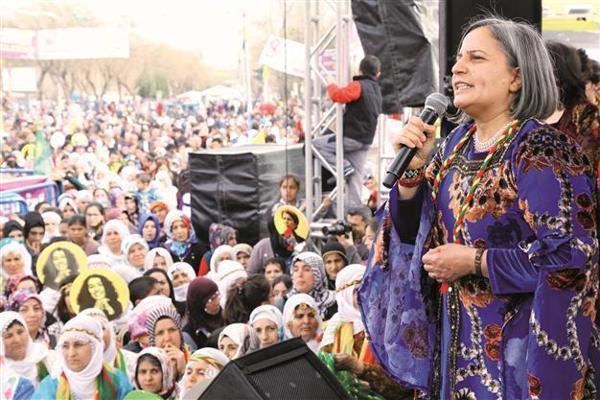Tension in Turkey neither tolerable nor sustainable, says BDP
Emine KART DİYARBAKIR - Hürriyet Daily News


'They say the government will keep tension up until the presidential elections in August, for another few months. Even if this is real, I don’t want to believe it,' Gültan Kışanak told Hürriyet Daily News in an exclusive interview. AA photo
The ruling Justice and Development Party (AKP) will either have to change its polarizing attitude on March 31 – the day after local elections – in taking a lesson from the polls results or will have to call for early elections due to the tension that it has ratcheted up in society, according to the Peace and Democracy Party (BDP).“I may sound optimistic, but I believe the election results will bring all, including the government, down to earth. The government has no chance of continuing with the same stance. Either it will change its stance or it will declare early elections. I’m not talking about a new balcony speech on March 31; what I mean is a real change of stance,” Gültan Kışanak, the BDP’s co-mayoral candidate for Diyarbakır, said in an interview with the Hürriyet Daily News over the weekend.
By “balcony speech,” Kışanak was referring to post-election speeches by Prime Minister Recep Tayyip Erdoğan following his party’s victories in the past. Those speeches were seen as conciliatory for various segments of society.
Kışanak, the co-leader of the BDP, is running alongside Fırat Anlı for the mayoralty in Diyarbakır. The BDP applies a co-leadership model in which one of the candidates is female wherever it runs.
“There is a scenario that I don’t want to believe. They say the government will keep tension up until the presidential elections in August, for another few months. Even if this is real, I don’t want to believe it,” Kışanak said.
“People here are not that puzzled to the extent that people in the west have been so far. They say, ‘We already knew it; they have done it here for many years.’ Nonetheless, in my opinion, Turkey cannot tolerate this tension anymore, this growing polarization. This tension must be calmed down and a process that responds to people’s demands shall start. I believe elections should be a means for this.
As long as a new political channel is not opened, parties in this tension may change, but the tension itself will go on. If even only 1 percent of these claims about the government are true, then they should resign. On the other hand, the ‘parallel structure’ is considering every unlawful way as legitimate in pressuring the government,” she said, referring to the movement backed by the U.S.-based Islamic scholar Fethullah Gülen, which is in a severe rift with the government.
“They were a coalition at the time. And the government can say nothing in this situation because of what it let happen at the time. Now it is time for people to say I want none of you,” she said.
Kışanak referred to reports claiming the presence of a hidden or silent cooperation between the Gülen Movement and the main opposition Republican People’s Party (CHP).
“If the CHP gets involved in an interest-based relation with the Cemaat [the common name of the movement], then they will have to pay a cost for it. The Gülen Movement is a movement which doesn’t at all favor freedom and democracy. It has been using methods that match with those of the ‘deep state’ tradition in Turkey. No clean politics come out of this.”
Deceived Kurds?
The BDP has the same grassroots as the outlawed Kurdistan Workers’ Party (PKK), whose leader Abdullah Öcalan is imprisoned and has been in dialogue with both state officials and the BDP at least since late 2012, as part of the peace process aimed at ending the three-decade-long conflict between Turkey’s security forces and the PKK.
The party has also said its stance on both the fate of the stalled peace process and grave claims of corruption and bribery involving the AKP are crystal clear.
For example, the BDP has already announced their deputies will be present in Parliament tomorrow for an extraordinary session for the reading of the summary of proceedings on four former ministers involved in a huge graft probe launched in mid-December 2013.
The BDP will also ask for a reading of the information and documents that are attached to the summary of proceedings for lawmakers’ information.
The demand from the BDP for such an elaboration on their approaches mostly stems from an argument suggesting “the Kurdish people are being deceived once more, like it has always been the case in history; this time, by the AKP.”
“Nobody can deceive us,” Kışanak said. “So far, who has deceived us and seized something from us? We have never assumed politics that follow in the AKP’s footsteps and have never dragged Kurdish people toward such position either. We are in favor of dialogue with the body, whoever has the authority of governing, which is now the AKP. But this doesn’t mean we are being submissive. That’s why I say people in Diyarbakır have confidence in saying, ‘We are the assurance of the resolution process.’ We are not drafting our route by looking at others. Since it has been seen that Kurds have power, everybody wants them to stand next to themselves. Yet, we do not have to be a sort of ‘reserve’ alongside another party.”
